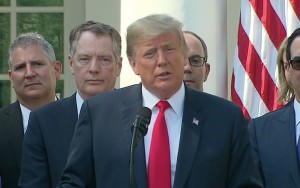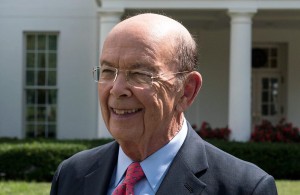
President Donald Trump believes raising tariffs will bring U.S. manufacturing back to prominence, but has put off a decision on new national security-related levies.
President Donald Trump’s decision to delay any action on new auto tariffs related to national security gives automakers a chance to make some choices about how they’re going to deal with new tariffs if Trump elects to implement them down the road.
Trump has six months to decide whether or not to slap levies on vehicles and parts from other countries under Section 232, a national security law that gives the president broad powers to implement tariffs on goods from other countries that may affect America’s national security.
He used it last year on steel and aluminum imports, much to the chagrin of automakers and other manufacturers.
Automakers and their suppliers warn new tariffs would result in higher prices on vehicles, including U.S.-built cars and trucks because they use parts imported from other countries. Imported parts make up as much as 50% of domestic vehicle content.
(Trump now expected to delay tariffs. Click Here for the story.)
A new 25% tariff would add more than $4,400 to price of new vehicles sold in the U.S., according to a report from the Center for Automotive Research. Imported vehicle prices would rise even more, by about $6,875, the group said.

Commerce Secretary Wilbur Ross completed the study declaring automotive imports could be declared a threat to national security.
“We are grateful for the additional time and for additional consideration,” said Ann Wilson, senior vice president at the Motor and Equipment Manufacturers Association, which represents suppliers to the auto industry. She added that suppliers “fundamentally disagree” with the notion that imported components are a national-security risk, the Wall Street Journal reported.
Howard Hakes, the president of the American International Automobile Dealers Association wrote in a blog this week that the Commerce report’s findings were “insulting.”
(Click Here to see Toyota’s CEO say he’s “sad” about being considered a security threat.)
“Dealers want, and deserve, official acknowledgement that our stores and our products are NO threat to the American way of life,” Hakes wrote, adding that, “We need a commitment from President Trump that auto tariffs – a massive tax hike on Americans looking for safe transportation – are off the table.”
The debate has resulted in some unusual bipartisanship in a capital that has often been gridlocked by political discord.
“We strongly urge you to advise the president against imposing trade restrictions that could harm the auto sector and the American economy,” more than 100 members of the House, wrote to economic adviser Kudlow last week.
(Commerce Dept report could trigger tariffs. Click Here for the story.)

Toyota is always waving the US flag trying to convince people its an American company (that sends billions of dollars BACK to Japan every year). So why are they complaining? Or maybe they’re not as American as they think they are?
Not too worry. When prices for Japanese/Korean branded vehicles goes up, people will just buy more traditional American brands. And when they have to cut production at transplants that have been getting tax abatements for decades, and have to lay off workers, those workers will be hired by American brands.
So where is the problem?